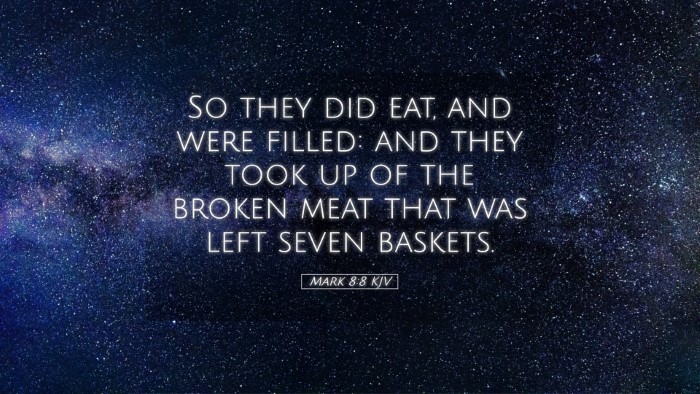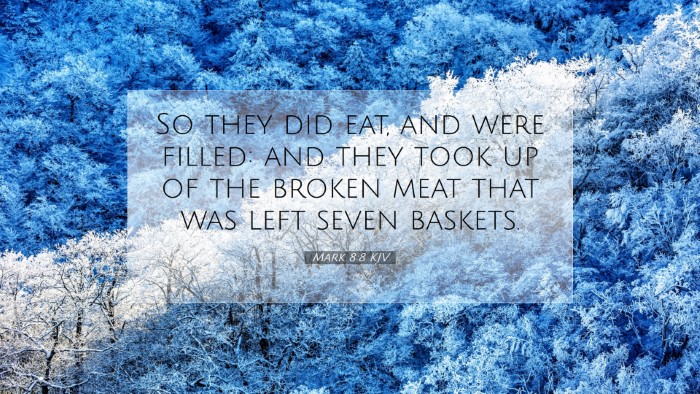Commentary on Mark 8:8
Verse Text: "So they did eat, and were filled: and they took up of the broken meat that was left seven baskets."
Introduction
The passage in Mark 8:8 narrates a miracle attributed to Jesus, which emphasizes His compassion and provision for the needs of the people. This account is pivotal as it illustrates both the physical and spiritual nourishment Christ offers to those who follow Him. As we delve deeper into this verse, insights from renowned public domain commentators such as Matthew Henry, Albert Barnes, and Adam Clarke will be synthesized to enrich our understanding.
Contextual Background
This miracle occurs in a region predominantly inhabited by Gentiles, which is significant in the wider narrative of the Gospel. Jesus' actions reflect His ministry extending beyond Jewish boundaries, showcasing the universal scope of His message. The earlier verses highlight the multitude's hunger, illustrating their spiritual and physical needs, thus setting the stage for this miracle.
Analysis of Key Themes
-
Divine Provision
Matthew Henry emphasizes that the feeding of the multitude was an example of Christ's abundant provision. He highlights that both the number of loaves and the baskets collected after the meal signify God's surplus blessings. This also mirrors the providential care that God shows to all His creation.
-
Spiritual Nourishment
Albert Barnes notes that the miracle of feeding the multitude transcends mere physical sustenance. It serves as a metaphor for the spiritual nourishment provided by Christ through His teachings and the Gospel. Barnes points out that Jesus came to satisfy deeper needs, such as forgiveness and eternal life, illustrating that physical hunger can lead to a yearning for spiritual fulfillment.
-
Response of the Crowd
Adam Clarke draws attention to the response of the crowd after the miracle. Their satisfaction is testament to the effectiveness of Christ's ministry. Clarke suggests that the excitement and wonder exhibited by the people were indicative of their recognition of Jesus' divine power, leading to increased faith and reverence for Him.
Significance of the Number Seven
The number seven holds biblical significance, often representing completeness and perfection. The seven baskets of leftovers in Mark 8:8 can thus symbolize the completeness of Jesus’ provision. Matthew Henry observes that this act was also a sign of assurance to the disciples that God's provisions are always more than sufficient, especially in times of need.
Lessons for Today
This passage invites contemporary readers—be they pastors, theologians, or students—to reflect on several key areas:
-
Trust in Divine Provision
Just as the multitude trusted Jesus to provide for their needs, believers today are encouraged to place their trust in God's provision, both for physical and spiritual sustenance.
-
Compassion for Others
As Jesus was moved by the needs of the crowd, followers of Christ are called to exhibit compassion towards those who are hungry and in need, mirroring the love of Christ in practical ways.
-
Understanding Spiritual Hunger
The miracle serves as a reminder that spiritual hunger should not be ignored. Just as physical hunger calls for nourishment, spiritual longing necessitates engagement with God’s Word and His community.
Conclusion
Mark 8:8 presents a profound narrative that encapsulates the essence of Jesus' mission on earth: to feed both body and soul. By analyzing this verse through the insights of noted commentators, we gain a richer understanding of its implications for both the original audience and for us today. The abundance of Christ—and the completeness of His provision—reminds us that in our physical and spiritual need, we can always turn to Him for fulfillment.


